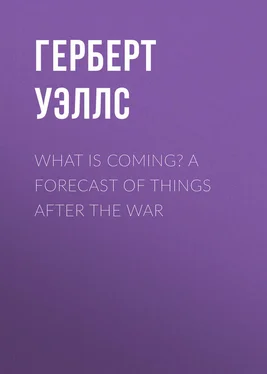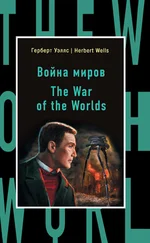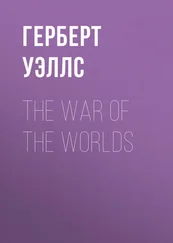Герберт Уэллс - What is Coming? A Forecast of Things after the War
Здесь есть возможность читать онлайн «Герберт Уэллс - What is Coming? A Forecast of Things after the War» — ознакомительный отрывок электронной книги совершенно бесплатно, а после прочтения отрывка купить полную версию. В некоторых случаях можно слушать аудио, скачать через торрент в формате fb2 и присутствует краткое содержание. Жанр: История, foreign_prose, на английском языке. Описание произведения, (предисловие) а так же отзывы посетителей доступны на портале библиотеки ЛибКат.
- Название:What is Coming? A Forecast of Things after the War
- Автор:
- Жанр:
- Год:неизвестен
- ISBN:нет данных
- Рейтинг книги:3 / 5. Голосов: 1
-
Избранное:Добавить в избранное
- Отзывы:
-
Ваша оценка:
- 60
- 1
- 2
- 3
- 4
- 5
What is Coming? A Forecast of Things after the War: краткое содержание, описание и аннотация
Предлагаем к чтению аннотацию, описание, краткое содержание или предисловие (зависит от того, что написал сам автор книги «What is Coming? A Forecast of Things after the War»). Если вы не нашли необходимую информацию о книге — напишите в комментариях, мы постараемся отыскать её.
What is Coming? A Forecast of Things after the War — читать онлайн ознакомительный отрывок
Ниже представлен текст книги, разбитый по страницам. Система сохранения места последней прочитанной страницы, позволяет с удобством читать онлайн бесплатно книгу «What is Coming? A Forecast of Things after the War», без необходимости каждый раз заново искать на чём Вы остановились. Поставьте закладку, и сможете в любой момент перейти на страницу, на которой закончили чтение.
Интервал:
Закладка:
That is one change the war will bring about that will make for world peace: a quickened general interest in its possibility. Another is the certainty that the war will increase the number of devoted and fanatic characters available for disinterested effort. Whatever other outcome this war may have, it means that there lies ahead a period of extreme economic and political dislocation. The credit system has been strained, and will be strained, and will need unprecedented readjustments. In the past such phases of uncertainty, sudden impoverishment and disorder as certainly lie ahead of us, have meant for a considerable number of minds a release-or, if you prefer it, a flight-from the habitual and selfish. Types of intense religiosity, of devotion and of endeavour are let loose, and there will be much more likelihood that we may presently find, what it is impossible to find now, a number of devoted men and women ready to give their whole lives, with a quasi-religious enthusiasm, to this great task of peace establishment, finding in such impersonal work a refuge from the disappointments, limitations, losses and sorrows of their personal life-a refuge we need but little in more settled and more prosperous periods. They will be but the outstanding individuals in a very universal quickening. And simultaneously with this quickening of the general imagination by experience there are certain other developments in progress that point very clearly to a change under the pressure of this war of just those institutions of nationality, kingship, diplomacy and inter-State competition that have hitherto stood most effectually in the way of a world pacification. The considerations that seem to point to this third change are very convincing, to my mind.
The real operating cause that is, I believe, going to break down the deadlock that has hitherto made a supreme court and a federal government for the world at large a dream, lies in just that possibility of an "inconclusive peace" which so many people seem to dread. Germany, I believe, is going to be beaten, but not completely crushed, by this war; she is going to be left militarist and united with Austria and Hungary, and unchanged in her essential nature; and out of that state of affairs comes, I believe, the hope for an ultimate confederation of the nations of the earth.
Because, in the face of a league of the Central European Powers attempting recuperation, cherishing revenge, dreaming of a renewal of the struggle, it becomes impossible for the British, the French, the Belgians, Russians, Italians or Japanese to think any longer of settling their differences by war among themselves. To do so will mean the creation of opportunity for the complete reinstatement of German militarism. It will open the door for a conclusive German hegemony. Now, however clumsy and confused the diplomacy of these present Allies may be (challenged constantly, as it is, by democracy and hampered by a free, venal and irresponsible Press in at least three of their countries), the necessity they will be under will be so urgent and so evident, that it is impossible to imagine that they will not set up some permanent organ for the direction and co-ordination of their joint international relationships. It may be a queerly constituted body at first; it may be of a merely diplomatic pretension; it may be called a Congress, or any old name of that sort, but essentially its business will be to conduct a joint fiscal, military and naval policy, to keep the peace in the Balkans and Asia, to establish a relationship with China, and organise joint and several arbitration arrangements with America. And it must develop something more sure and swift than our present diplomacy. One of its chief concerns will be the right of way through the Bosphorus and the Dardanelles, and the watching of the forces that stir up conflict in the Balkans and the Levant. It must have unity enough for that; it must be much more than a mere leisurely, unauthoritative conference of representatives.
For precisely similar reasons it seems to me incredible that the two great Central European Powers should ever fall into sustained conflict again with one another. They, too, will be forced to create some overriding body to prevent so suicidal a possibility. America too, it may be, will develop some Pan-American equivalent. Probably the hundred millions of Latin America may achieve a method of unity, and then deal on equal terms with the present United States. The thing has been ably advocated already in South America. Whatever appearances of separate sovereignties are kept up after the war, the practical outcome of the struggle is quite likely to be this: that there will be only three great World Powers left-the anti-German allies, the allied Central Europeans, the Pan-Americans. And it is to be noted that, whatever the constituents of these three Powers may be, none of them is likely to be a monarchy. They may include monarchies, as England includes dukedoms. But they will be overriding alliances, not overriding rulers. I leave it to the mathematician to work out exactly how much the chances of conflict are diminished when there are practically only three Powers in the world instead of some scores. And these new Powers will be in certain respects unlike any existing European "States." None of the three Powers will be small or homogeneous enough to serve dynastic ambitions, embody a national or racial Kultur, or fall into the grip of any group of financial enterprises. They will be more comprehensive, less romantic, and more businesslike altogether. They will be, to use a phrase suggested a year or so ago, Great States… And the war threat between the three will be so plain and definite, the issues will be so lifted out of the spheres of merely personal ambition and national feeling, that I do not see why the negotiating means, the standing conference of the three, should not ultimately become the needed nucleus of the World State for which at present we search the world in vain.
There are more ways than one to the World State, and this second possibility of a post-war conference and a conference of the Allies, growing almost unawares into a pacific organisation of the world, since it goes on directly from existing institutions, since it has none of the quality of a clean break with the past which the idea of an immediate World State and Pax Mundi involves, and more particularly since it neither abolishes nor has in it anything to shock fundamentally the princes, the diplomatists, the lawyers, the statesmen and politicians, the nationalists and suspicious people, since it gives them years in which to change and die out and reappear in new forms, and since at the same time it will command the support of every intelligent human being who gets his mind clear enough from his circumstances to understand its import, is a far more credible hope than the hope of anything coming de novo out of Hague Foundations or the manifest logic of the war.
But, of course, there weighs against these hopes the possibility that the Allied Powers are too various in their nature, too biased, too feeble intellectually and imaginatively, to hold together and maintain any institution for co-operation. The British Press may be too silly not to foster irritation and suspicion; we may get Carsonism on a larger scale trading on the resuscitation of dying hatreds; the British and Russian diplomatists may play annoying tricks upon one another by sheer force of habit. There may be many troubles of that sort. Even then I do not see that the hope of an ultimate world peace vanishes. But it will be a Roman world peace, made in Germany, and there will have to be several more great wars before it is established. Germany is too homogeneous yet to have begun the lesson of compromise and the renunciation of the dream of national conquest. The Germans are a national, not an imperial people. France has learnt that through suffering, and Britain and Russia because for two centuries they have been imperial and not national systems. The German conception of world peace is as yet a conception of German ascendancy. The Allied conception becomes perforce one of mutual toleration.
Читать дальшеИнтервал:
Закладка:
Похожие книги на «What is Coming? A Forecast of Things after the War»
Представляем Вашему вниманию похожие книги на «What is Coming? A Forecast of Things after the War» списком для выбора. Мы отобрали схожую по названию и смыслу литературу в надежде предоставить читателям больше вариантов отыскать новые, интересные, ещё непрочитанные произведения.
Обсуждение, отзывы о книге «What is Coming? A Forecast of Things after the War» и просто собственные мнения читателей. Оставьте ваши комментарии, напишите, что Вы думаете о произведении, его смысле или главных героях. Укажите что конкретно понравилось, а что нет, и почему Вы так считаете.

![Герберт Уэллс - The War of the Worlds [С англо-русским словарем]](/books/26611/gerbert-uells-the-war-of-the-worlds-s-anglo-thumb.webp)










